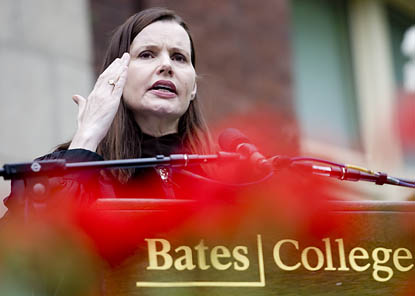Address by Geena Davis

Unedited transcript, subject to change and correction, of Commencement 2009 remarks by Geena Davis, who received the honorary degree Doctor of Fine Arts.
It is a great honor to be here today with you graduates, on such an important day in your lives. It turns out that it’s an important day for me too. I am deeply grateful and humbled by this honor and I want to thank the Trustees and President Elaine Tuttle Hansen for bringing me into the Bates community in such a meaningful way. If I can, I would like to add that hereafter I would prefer to be referred to as “Dr. Davis” [laughter].
I remember my own college days so fondly, and the friends that I made in college turned out to be lifelong friends. High school friends, I couldn’t care less about [laughter]. As you embark on this new chapter in your lives I’d like to talk with you a little bit about change, and how it comes about or doesn’t.
It has seemed to me that in many areas of society, it’s a common belief that progress will happen naturally, on its own, and that as time goes by things will change and are changing for the better. Or we believe that the necessary change has already taken place. It is particularly true in my industry, where they are continually announcing that things are better now for women actors. The fact is, the ratio of male to female characters is not only dismal but has remained stagnant for several decades.
And that isn’t even the whole story.
There is also a significant gender disparity that exists, with a few notable exceptions like Dora the Explorer, in the movies and TV shows that are made for our youngest kids. When I started watching this kind of entertainment with my little daughter, I was stunned to see what I perceived to be a clear dearth of female characters. I had assumed that in the 21st century, we are no longer feeding kids an image of society where women and girls don’t take up half the space — which studies show that we do [laughter].
About four years ago, I launched this nonprofit program which sponsored the largest content analysis of G-rated movies and TV shows made for children 11 and under. And the results were stunning. They showed that our kids are seeing a very unbalanced world — three male characters for every one female, and that the ratio worsens significantly in group or crowd scenes. And of the female characters that did exist, the vast majority were highly stereotyped or hypersexualized. When we looked at occupations, for 37 percent of the girls, it was royalty. Which is a job that’s a little hard to come by [laughter].
What’s more, during the 15 years that the study covered, no improvement was made in the numbers whatsoever. No change had happened on its own, in the natural course of things.
What about other areas, where we assume change is happening in the natural course of things? Let’s look at our legislature. Women now make up 16 percent of Congress. If we add women at the rate we already have been, we will achieve parity in 500 years. I am going out on a limb here, so I want to keep this between me and the 1,000 of you. I say that’s too slow! I would like to see that cut in half. I think that a quarter of a millennium is plenty of time to achieve this [applause and laughter].
The U.S. is currently ranked 68th in the world in terms of female representation in government. We’re right behind Andorra. Clearly, left to itself this pace of change is abysmal, and in so many areas of our society, change must be firmly and continuously pushed in order to be effected.
But the first thing is for all of us to notice areas where change is necessary or is happening too slowly. I ask you to do so, especially in terms of men and women coming to share the sandbox equally, in the spirit of brother and sisterhood, to see with new eyes, to count the women characters in the next movie you see, to encourage your women friends who have leadership qualities to run for office. Society can only benefit if more women are at the table.
And that is my message to you today. I’ll close with a word from Charles Malik, the former president of the United Nations General Assembly: “The fastest way to change society is to mobilize the women of the world.” Thank you.